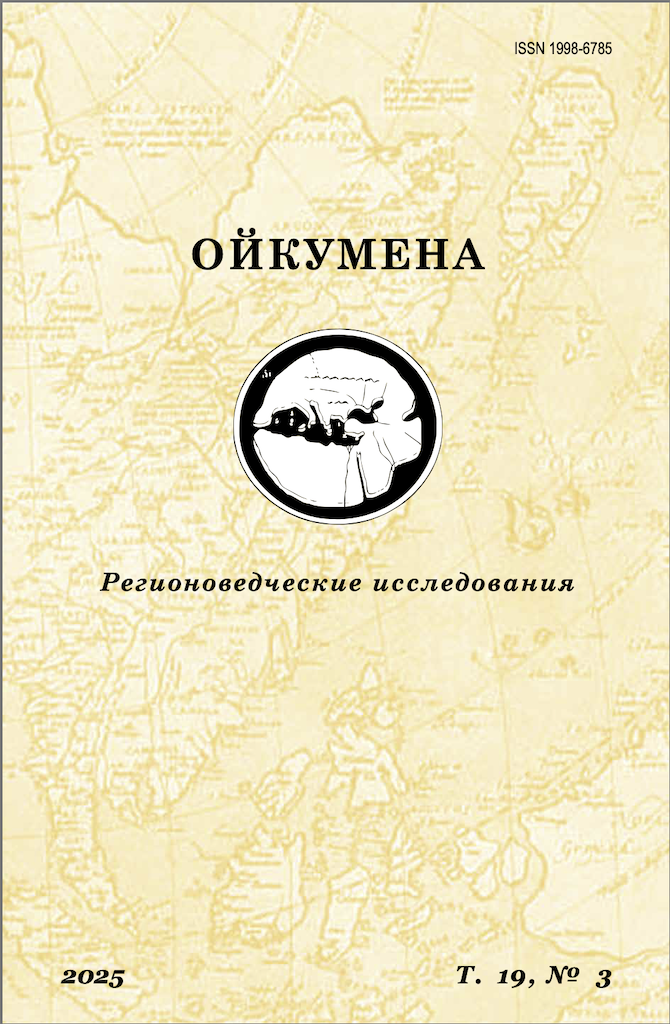employee
Moskva, Moscow, Russian Federation
UDC 327
The current Arctic governance draws a clear distinction between Arctic and non-Arctic countries, which limits China’s participation in it. To overcome this limitation, Beijing has been making efforts to construct its identity in Arctic affairs and develop a new philosophy of Arctic governance that will provide non-Arctic states with greater opportunities to participate in Arctic affairs. This article is one of the first study in Russian scientific literature on the process of China’s conceptualization of its identity in Arctic affairs. The purpose of this article, written within the framework of a constructivist approach, is to identify the features of China’s self-positioning in Arctic affairs at each stage of the conceptualization of its Arctic identity. The main method used is a qualitative discursive analysis of Chinese research literature from 2022–2025, taking into account the peculiarities of the current geopolitical situation in the Arctic and revealing the evolution of foreign policy rhetoric and conceptualization of China’s Arctic identity. The article presents China’s identity as having gone through three stages: "non-Arctic country", "near-Arctic country", "stakeholder in Arctic affairs". It is concluded that China’s current Arctic identity should be considered ideologically as a three-tier system combining the philosophy of the concept of "community with a common destiny for mankind", "responsible great power" and "stakeholder in Arctic affairs". In addition to those that are widely used in Chinese official documents, the article also analyzes concepts that are still circulating at the expert level – "community with a common Arctic destiny" and "Global Arctic". It also summarizes Chinese assessments of the impact of the new geopolitical situation on the formation of China’s Arctic identity. It is concluded that China’s work on theoretical justification of increasing China’s role in Arctic governance up to its acquisition of status and rights equal to the Arctic countries will be continued.
China, Arctic, Arctic identity, "stakeholder in Arctic affairs", concept of "community of shared destiny for mankind", "community of shared Arctic destiny", Arctic governance, Global Arctic
1. Gudev P. Arctic Ambitions of the Celestial Empire // Russia in Global Affairs. 2018. Vol. 6. No. 5. P. 174–184. (In Russ.).
2. Denisov I. E. The Concept of "Discursive Power" and the Transformation of Chinese Foreign Policy under Xi Jinping // Comparative Politics Russia. 2020. No. 4. P. 42–52. https://doi.org/10.24411/2221-3279-2020-10047. (In Russ.). EDN: https://elibrary.ru/VHJNYJ
3. Leksyutina Ya. V. China and India in the Arctic: Interests, Strategies, and Cooperation with Russia // Ojkumena. Regional Researches. 2019. No. 4. P. 40–48. https://doi.org/10.24866/1998-6785/2019-4/40-48 (In Russ.). EDN: https://elibrary.ru/UIVMRH
4. Leksyutina Ya. V. On the Dual International Identity of Contemporary China // Journal of International Analytics. 2024. No. 15 (1). P. 63–76. https://doi.org/10.46272/2587-8476-2024-15-1-63-76 (In Russ.). EDN: https://elibrary.ru/HSKCFL
5. Lei Shuang. China’s Positioning in the Arctic: Evolution of Concepts and Promotion Mechanisms // Pacific Rim: Economics, Politics, Law. 2021. Vol. 24. No. 4. P. 99–110. (In Russ.). DOI: https://doi.org/10.24866/1813-3274/2021-4/99-110; EDN: https://elibrary.ru/KGZNNO
6. Wang Xinhe. China’s Arctic Identity from the Perspective of National Interests // Pacific Journal. 2013. No. 5. P. 81–89. (In Chin.).
7. Gu Hongneng, Ran Jinlan. China’s Plan for Transforming the Governance of the Arctic Commons in the Context of a Community with a Shared Future for Mankind // Decision and Information. 2024. No. 566 (2). P. 5–13. (In Chin.).
8. Li Zhenfu, Wang Qun, Qi Xinli. New Concept of Sino-Russian Arctic Cooperation from the Perspective of "Global Arctic" // Political Civilization. 2025. No. 617 (3). P. 9–15. (In Chin.).
9. Song Han. The Rules-based International Order in the Arctic: U.S. Policies and Actions to Control the Arctic // Strategic Decision Research. 2025. No. 2. P. 105–128. (In Chin.).
10. Sun Kai. Participation Practice, Discourse Interaction and Identity Recognition: Understanding the Process of China’s Participation in Arctic Affairs // World Economy and Politics. 2014. No. 7. P. 42–62. (In Chin.).
11. Zhang Cheng, Zuo Zhengyan. Chinese Role in Arctic Governance: Constructive Elements, Reconstructive Motivation and Improvement Path // Decision and Information. 2024. No. 572 (8). P. 43–52. (In Chin.).
12. Zhang Cheng, Yang Jiaqi. Study on the Feasibility of Cooperation in the Arctic between China and Other No.rtheast Asian Countries // Decision and Information. 2023. No. 7. P. 29–37. (In Chin.).
13. Zhao Ningning, Zhang Yanghan. Risks Facing China’s Current Arctic Rights and Interests and Their Solutions – From the Perspective of Arctic Geopolitical Game // Socialist Studies. 2024. No. 3. P. 153– 161. (In Chin.).
14. Zhao Yang. Identity Narrative and the Construction of China’s Identity in Arctic Affairs // Northeast Asia Forum. 2022. No. 159 (1). P. 96–115. (In Chin.).
15. Keynote Speech by Vice Foreign Minister Zhang Ming at the China Country Special Session of the "Third Arctic Circle Forum Conference". 17.10.2015. URL: https://www.fmprc.gov.cn/web/ziliao_674904/zyjh_674906/201510/t20151017_7945486.shtml (accessed 02.07.2025). (In Chin.).











